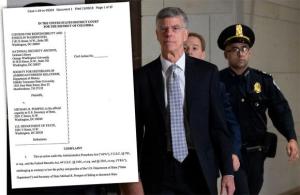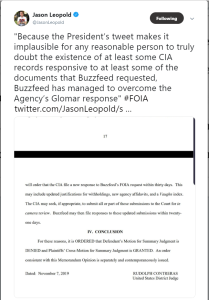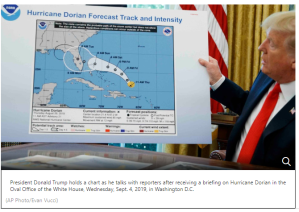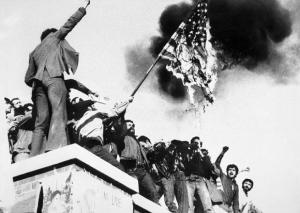Archive, CREW, Historians Sue Pompeo and the State Department over Failure to Create Records, and More: FRINFORMSUM 11/8/2019
 Archive, CREW, Historians Sue Pompeo, State Department for violating FRA
Archive, CREW, Historians Sue Pompeo, State Department for violating FRA
The National Security Archive, together with Citizens for Responsibility and Ethics in Washington (CREW) and the Society for Historians of American Foreign Relations (SHAFR), recently sued Secretary of State Mike Pompeo and the Department of State for violating the Federal Records Act by failing to create and preserve essential State Department records. The legal team representing the plaintiffs in the case is led by Anne Weismann and Conor Shaw of CREW, and pro bono counsel George Clarke and Mireille Oldak of Baker McKenzie.
Evidence from the House’s impeachment inquiry, including testimony from Ambassador William Taylor, the chargé d’affaires for Ukraine under the Trump administration, speaks to a pattern and practice of bypassing official record-keeping procedures at the State Department. In discussing a June 28 State-organized phone call with Ukrainian President Zelenskyy, Ambassador Taylor testified that, not only did the Ambassador to the European Union Gordon Sondland exclude most of the regular interagency participants from the call, but that “Ambassador Sondland said that he wanted to make sure no one was transcribing or monitoring as they added President Zelenskyy to the call.” This is a direct violation of the State Department’s obligation under the Federal Records Act to document agency policies, decisions, and essential transactions.
The FRA lawsuit comes on the heels of a related Presidential Records Act case that the Archive, CREW, and SHAFR filed in May 2019 to compel the White House to create and preserve records of the President’s meetings with foreign leaders. The PRA suit was filed after news reports indicated that no such records existed for at least five meetings with Russian President Vladimir Putin, one meeting with North Korean leader Kim Jong Un, and a meeting with Saudi Arabian Prince Mohammad Bin Salman.
 Leopold Gets Big Glomar Win
Leopold Gets Big Glomar Win
Buzzfeed’s Jason Leopold – represented by Jeffrey Light – has won a significant legal victory against the CIA’s expansive use of the Glomar exemption. (A “Glomar” response is when an agency refuses to confirm or deny the existence of documents in response to a FOIA request because “the existence or nonexistence of requested records is currently and properly classified.” The pernicious tactic has been adopted by other federal agencies and some state and local entities, including the New York Police Department.)
In July 2017 the Washington Post ran a story about the Trump administration’s termination of a covert CIA program to pay and arm Syrian rebels, a week later the President tweeted that “the Amazon Washington Post fabricated the facts on my ending massive, dangerous, and wasteful payments to Syrian rebels fighting Assad,” and several weeks later Leopold filed a FOIA request with the Agency concerning the terminated program. The CIA tried to respond with a Glomar, and Leopold sued. The court ruled in Leopold’s favor, finding that “Because the President’s tweet makes it implausible for any reasonable person to truly doubt the existence of at least some CIA records that are responsive to at least some of the nine categories of documents that Buzzfeed requested, Buzzfeed has managed to overcome the Agency’s Glomar response and the Agency has failed to meet its burden in this case.”
Buzzfeed FOIA Suits Win Release of FBI’s “302” Reports on Russian Investigation
A Buzzfeed News reporting team – including Jason Leopold, Zoe Tillman, Ellie Hall, Emma Loop, and Anthony Cormier – has published a trove of material won in response to five separate FOIA lawsuits concerning special counsel Robert Mueller’s investigation of Russian interference in the 2016 election. The documents are the FBI’s 302 reports – summaries of interviews – and include a number of revelations about Paul Manafort, Michael Cohen, and Rick Gates. As Buzzfeed notes, “They reveal what key players in the campaign told FBI agents about Russia, Trump, the email hack during the 2016 presidential campaign, and Trump’s associates’ handling of the special counsel’s investigation.”
The documents, which can be read here, are the first in a series of court-ordered releases and future installments “will be released every month for at least the next eight years.”
Facial Recognition Software Subject of Second FOIA Lawsuit in As Many Weeks
The Project on Government Oversight (POGO) is suing Immigration and Customs Enforcement for its failure to turn over documents on its use of Amazon’s facial recognition software, Rekognition. The Washington Post notes that POGO filed eight separate FOIA requests with ICE between 2018 and 2019 for documents on “ICE’s surveillance capabilities, detention methods and possible civil rights violations,” as well as FOIA requests for information on marketing materials related to Amazon’s pitch or any analysis of the software’s effectiveness. In each instance ICE either ignored the request or responded with a paltry number of documents.
Last week the ACLU filed a FOIA suit against the Justice Department, the Drug Enforcement Administration, and the FBI for documents on their use of facial recognition software. Specifically, “ACLU attorneys asked a federal court in Massachusetts to order the agencies to release documents about how the government uses and audits the software, how officials have communicated with companies that provide the software, and what internal guidelines and safeguards regulate its use.”
 NOAA Chastised Forecasters for Contradicting Trump’s Inaccurate Hurricane Dorian Tweet, Despite Knowledge Forecasters were Acting in Response to Public Panic
NOAA Chastised Forecasters for Contradicting Trump’s Inaccurate Hurricane Dorian Tweet, Despite Knowledge Forecasters were Acting in Response to Public Panic
Emails released through FOIA are shedding light on the National Oceanic and Atmospheric Administration’s (NOAA) decision to publicly rebuke its own weather forecasters in Birmingham, Ala. for contradicting President Trump’s repeated and erroneous claims that Alabama was in danger of being hit by Hurricane Dorian this September. The emails show that NOAA, which is part of the Commerce Department, knew as of Sept. 2 that forecasters at the agency’s National Weather Service office in Alabama were responding to frantic calls from citizens – and not an earlier tweet from President Trump – when it tweeted that “Alabama will NOT see any impacts from #Dorian.” Yet, after five days of the President falsely insisting that Alabama was in danger from the hurricane – including parading a forecasting map that had been altered with a Sharpie – the NOAA issued an unsigned statement that chided the forecasters for speaking “in absolute terms that were inconsistent with probabilities from the best forecast products available at the time.” The backing of the president at the expense of science and public safety infuriated members of the public and weather researchers alike, and the released emails also show NWS officials trying to boost moral within the administration after the NOAA’s public admonishments.
 TBT – 1979 Iran Hostage Crisis Recalled
TBT – 1979 Iran Hostage Crisis Recalled
On November 4, 1979, a group calling itself the Students Following the Line of the Imam stormed the gates of the U.S. Embassy in Tehran, seized control of the compound, and took several dozen American diplomats, Marine guards, and others hostage. Thus began a 444-day ordeal that shocked the world, fundamentally altered the political scene in Iran, and cemented negative perceptions in the West of the country’s Islamic leadership.
Forty years later, the Iran hostage crisis is still critical to understanding the bitter nature of relations between Iran and the United States. It instantly formed a core part of the American narrative about the Islamic Republic as a regime willing to flout international law and universal moral principles, a view that has colored much of U.S. policymaking ever since.
This week, the National Security Archive posted a small sampling of declassified records that recall that pivotal episode. They include a memo from National Security Advisor Zbigniew Brzezinski to President Carter suggesting several hardline actions including replacing Ayatollah Ruhollah Khomeini as Iran’s leader and even overt intervention (see Document 07). Carter was not prepared to take up any of these options but they indicate the level of alarm created by events in Tehran.
The documents are part of the soon-to-be-published U.S. Policy toward Iran: From the Revolution to the JCPOA, 1978-2015, a collection of almost 2,000 documents that is the latest in the “Digital National Security Archive” series through the academic publisher ProQuest.
Sign Up
Want to stay on top of the latest FOIA news? Click here to sign up for our weekly FRINFORMSUM (Freedom of Information Summary) email newsletter.

Comments are closed.